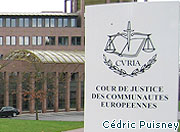Scientists will no longer be able to patent stem cell work which involves the destruction of human embryos after a landmark ruling last month.
Commentators welcomed the ruling, with one bioethics group saying it was a “triumph of ethical standards over commercial interest”.
The decision, from the European Court of Justice (ECJ), now means scientists may be encouraged to divert their attention to adult stem cells.
Life
Techniques involving adult stem cells do not involve the destruction of human embryos and have already been used in more than 100 treatments or clinical trials.
The ECJ also looked at the concept of the human embryo and said that it “must be understood in a wide sense”.
The case was initiated in Germany by Greenpeace. It welcomed the decision, saying the court had “strengthened the protection of human life against commercial interests within the EU”.
Delight
A blog on the campaign group’s website commented: “Greenpeace is against the patenting of human life. Greenpeace is not anti-stem cell research.”
The move is blow to supporters of embryonic stem cell research. Prof Austin Smith, of a stem cell research group at the University of Cambridge called the Court’s decision “unfortunate”.
But Dominica Roberts, Chairman of the ProLife Alliance, said the group was “delighted” at the ruling.
She said: “Perhaps this will encourage scientists to divert their efforts to seeking more cures with adult stem cells. Use of adult stem cells is not only entirely ethical but has so far proved much more effective.”
Fruitful
Peter Liese, an MEP with the Christian Democrats, commented: “We are in favour of research and development in biotechnology, but human beings must not be destroyed, not even in the early stages of their development.”
And Peter Saunders, CEO of Christian Medical Fellowship, said: “The ruling does not stop embryo research but it could well take the wind out of the European biotechnology industry’s sails by making it no longer economically viable to fund embryonic stem cell research.”
He said this would mean “less money wasted on blind alley research” and more “being invested where it is really needed for the good of all” – in technologies which do not involve the destruction of human embryos.
Dr Saunders continued: “This court ruling may actually prove to be the best thing that ever happened to stem cell research in Europe by closing ‘a road to nowhere’ and opening a new highway to research that is both ethical and fruitful.”

